This week in AB
Swing time
I’ve always found people interesting — not so much individually (far too much variance), but collectively. When I dipped my toe back into post-secondary to finish my degree, I began with psychology and the second half of English. I signed up for statistics, criminology, and political science the following school year. Shockingly (to me), there was far more relevance to politics in my sociology classes than political science. I kept every book I bought for school except one: the mind-numbingly boring one about government and bureaucracy (intro to polisci — I’m told it gets better, though).
I think it takes a very special temperament to work in the public service and I do not have it. In the best case scenario, the public service can welcome and reward creativity and ingenuity. In the worst, all of that can be stifled by so many written and “office” rules that it’s both demoralizing and intellectually suffocating. I worked briefly in three departments and the first and third were so bad that the statistical probability of landing in a space where I could thrive was far too low to ever consider returning.
Sociology teaches students about Marx and his philosophies, it’s true; his theories were an important contribution to philosophy — even, or especially (because it’s not actually an indoctrination process), if one disagrees with them. It also teaches about the philosophies of Max Weber, Emile Durkheim, Michel Foucault, Herbert Spencer, and many others. The point of learning about them was never to agree with their philosophies, but to understand the lens through which they viewed society — if you cannot identify a Marxist theory, then did you even learn it?
One cannot learn about critical theory without acknowledging those who contributed greatly to its foundation, nor can one learn about political history without acknowledging those who did great, as well as horrific, things.
On Real Talk with Ryan Jespersen this week, he and Charles Adler talked about whether the pendulum of political desire was swinging back to the right. It was spurred by a Bill Maher monologue in which he says the left is going too far. Adler responded to that by noting people are rejecting left-of-centre authoritarianism by embracing right-of-centre authoritarianism. It’s a lose-lose situation.
The issue, to me, is that the people who are profiled most represent an immoveable, and — in line with published/broadcast opinion generally — potentially controversial viewpoint. They are digging in their heels on what is expected and acceptable to them; it’s far too diverse and inconsistent to apply generally — but we do this, easily, with disappointing regularity — ie: how stereotyping grows into prejudice, which leads to othering, us vs. them rhetoric and, eventually, a willingness to dismiss anything that challenges that perspective.
I’m guilty of it myself unless something (like this post topic) reminds me to be more mindful of the lazy attribution of one person’s commentary to those we blanket with unquestioningly approving of the same.
However, falling into this trap — while great clickbait and fodder for “likes” — also restricts the ability of the speaker to reach those they intentionally demonize, or unwittingly exclude, with their language.
“The left” or “the right” is big or small, depending on where the speaker positions themselves, yet, it is also highly individualized by those who believe one or the other better reflects their values or beliefs generally. Even if they wouldn’t necessarily place themselves into that category, wherever they perceive the speaker to be determines whether they will identify with the speaker or the target.
Goldilocks and the five leadership candidates
Since the start of the Alberta NDP leadership race — and, arguably earlier — I’ve been taking stock of my own reactions to the language being used.
When Kathleen Ganley’s communications team decided to attack Naheed Nenshi, it repelled a lot of tepid NDP supporters — not just myself. I highly suspect they accepted some bad strategic advice, but in their defence, they evaluated the response and quickly changed their tone; the NDP isn’t running a conservative leadership race, just like the UCP wasn’t running a PC leadership race and its best if the strategy reflects that.
As someone who is more familiar with conservative politics, either by upbringing or influence of my immediate surroundings, I don’t respond positively to “NDP-specific” messaging like Sarah Hoffman’s. “We don’t need an outsider telling us who (the NDP is); we know who we are,” she recently said. Great; but I’m not sure who you are, so I don’t know what that means.
A friend once had a run-in with NDP supporters for criticizing something Rachel Notley said in the lead up to the election in 2015. His response? “It’s not my problem if I didn’t understand what she meant, it’s her (or her communications staff’s) problem for not properly communicating what she meant.”
It’s why communications generally, and political communications specifically, have evolved into the highly relevant professions they are.
Hoffman’s messaging is very specific to the loyal base of the NDP and it’s important that someone is speaking directly to them. They will know they matter and Hoffman’s voice and representation within the NDP matters as well; but it doesn’t speak to me.
Kathleen Ganley has decided to start using legal-ease in her campaign — “prosecute the UCP” — which I sort of get — she’s a lawyer and it differentiates her from the other candidates, but it doesn’t really draw me, as a non-lawyer, in. It also has the unfortunate side effect of giving me unpleasant memories of “lock her/them up”. I’m sorry, but voters who might relate to that messaging aren’t available to you and please stop taking strategic advice from people who speak far more than they listen.
I think Ganley speaks to both relatively new and loyal members, and she really rocked that Jespersen interview. If this was a four-person race, I think she’d be running away with it as a bridge between the old and new.
Jodi Calahoo-Stonehouse is doing an excellent job building her profile and I hope her platform is gaining attention with her targeted audience — conservationists and Indigenous members. These groups represent both traditionally conservative (it’s right there in the name) and those who feel a lack of representation or outright neglect from provincial leaders (until recently). I also think her voice will be exceptionally important as the party grows, but she’s not speaking to me, either.
I understand there are a lot of “blue collar” workers in this province (I was raised by one, and I both grew up, and still live, in a town in rural Alberta), but I’m not one of them. Considering those I am surrounded by weren’t even willing to buy a membership as a personal favour to help me get some swag, Gil McGowan’s “worker-targeted” messaging doesn’t resonate with me, or one of my circles, unfortunately.
Just to be clear, it hasn’t escaped my attention that my expectations are sometimes deemed selfish, shallow, and even nit-picky. It’s fine; I know I’m an anomaly — if there’s an exception to anything, I usually find myself already positioned within it — but I take into consideration what those around me think, and what arguments are being brought against supporting the NDP. Even if they don’t necessarily resonate with me, I understand that for others, they absolutely do. It’s hard to ignore that.
I have found that the person who speaks to me, and the person who I feel will convert the party’s possible chance at regaining government to a plausible chance, is Naheed (pronounced “Na-head”) Nenshi.
Some have brought up his “baggage” as a municipal Mayor — have you met Danielle Smith? — while others have noted that he’s great at being a one-man show but are uncertain about whether he has the mettle, or temperament, to lead.
Yet, there’s a saying about leaders — leaders are not born, people become leaders when circumstances require them to do so.
Alberta progressives, centrists, moderates, and independents are demanding a leader now; one who will usher Alberta into the 21st century as a dominant force in technology and innovation of old industries and new — as a beacon of potential by ensuring all of its citizens have the opportunity to succeed without fear that the rug will be ripped from under their feet by a spurious argument in a Facebook post.
I think we were all open to who that leader could be, and there are three leadership debates within which every candidate has the opportunity to prove they will be that person. If you are willing to spend $10 to buy a membership, you can decide who that person should be.
The deadline is Sunday, April 21.
Women of ABpoli is a reader-powered publication. Thanks to everyone who reads, shares, and becomes a free or paid subscriber — your support is greatly appreciated!







Your analysis speaks to me. It’s exactly how I’m framing the leadership choice.
Good analysis of the candidates and it mirrors my opinion. I’m happy they all seem completely capable and if the NDP form the next government, there’s some serious talent there.